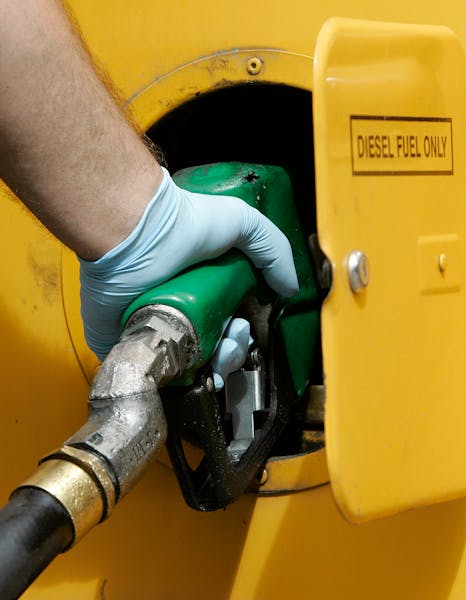WASHINGTON -- Minnesota's congressional delegation is parading home for July 4th without much to brag about on the season's hottest political topic: $4-per-gallon gas.
Election-year maneuvering has sparked a flurry of legislation, including a proposal by Sen. Norm Coleman to open Florida's outer continental shelf to oil and gas exploration, an echo of an idea that has gained currency in Republican circles.
But Democrats who control Congress, among them Sen. Amy Klobuchar of Minnesota, have put their energy into efforts to tax the "windfall" profits of the nation's biggest oil companies, a move they say could generate billions of dollars for new technologies to wean the nation from its dependence on fossil fuels.
Without the votes to do either, however, the result has been a stalemate yielding little but sound-bite fodder for the summer's presidential campaign.
As oil topped $140 a barrel on Friday, lawmakers in both parties are preaching conservation and a host of new energy sources. But some analysts say there's not much Congress is likely to do that will help at the gas pump any time soon.
What's going on? 'Nothing'
"The question is what substantive is going on in the energy front, and the answer is nothing," said energy industry lobbyist Frank Maisano. "This is what always happens six months before an election."
Both sides have banked on motorists' frustration with spiking prices to dust off pet proposals. For some Republicans, including U.S. Rep. Michele Bachmann of Minnesota, that would include drilling in Alaska's Arctic National Wildlife Refuge (ANWR), an idea that was opposed by her GOP predecessor, Mark Kennedy, as well as by Coleman.
Democrats, meanwhile, have turned their attention to the energy markets, enlisting the aid of Northwest Airlines CEO Doug Steenland, who testified that excessive speculation has pushed oil prices to unprecedented levels.
Klobuchar is backing a bill that would give the Commodity Futures Trading Commission additional authority to investigate the energy markets. Republicans, in a comprehensive energy plan presented Thursday, made a similar proposal.
"The experts tell us that a good amount of the money we now pay at the pump is going into the bank accounts of financial speculators," Klobuchar said last week at a meeting with business leaders in Minneapolis.
Some experts have told Congress that speculation in oil futures could be adding a $40-a-barrel premium to the price of oil, which translates to about $1 a gallon at the pump.
But critics say that policing the financial markets, much like a windfall profits tax, would do little to increase worldwide oil supplies, which some energy analysts see as the root of the problem.
On the other side are claims by Bachmann and others that lifting restrictions on oil and gas drilling could cut the price of gasoline in half. "If Congress would just lift the ban, America could be on the fast track to energy independence, millions of new jobs and $2 gasoline," she said.
'Drill on what you have'
That $2 gas scenario has its skeptics, with worldwide demand growing not only in the United States but in populous China and India.
Rather than opening new areas to exploration, Democrats want to compel oil and gas companies to produce on the 68 million acres of federal lease areas that they say are now sitting idle.
"Drill on what you have," said Rep. Tim Walz, D-Minn., who supports House legislation that requires oil companies to develop the lease areas they have or lose them.
On the presidential campaign trail, the debate has become mired in two competing mantras: the Democrats' "We can't drill our way out" vs. the Republicans' "We can't conserve our way out."
Arizona Sen. John McCain, the presumptive Republican nominee, has signed on to GOP efforts to lift restrictions on offshore drilling, or to at least allow coastal states to do so. Meanwhile, Illinois Sen. Barack Obama, the presumptive Democratic nominee, has endorsed the windfall profits tax and market regulation.
The two have also jousted over McCain's call for a summerlong "holiday" from the federal gas tax, a proposal that many Democrats dismiss out of hand since it's a primary source of revenue for roads and bridges, including the collapsed I-35W bridge in Minneapolis.
'No-energy bill'
In the marquee energy vote of this season, a Senate showdown on the windfall profits tax, Democrats fell nine votes shy of the 60 needed to end a Republican filibuster.
Democratic leaders were not subtle about their plans to use the vote against Republicans in November. "Of everything they have done so far in terms of obstruction, this is the politically most damaging," said New York Sen. Chuck Schumer, who heads the Democrats' Senate campaign committee.
Republican leaders dubbed it the "no-energy bill," saying a windfall tax would do little to alleviate the pain at the pump and could, if anything, push prices up as oil companies pass the tax increases onto motorists.
Coleman, navigating one of the nation's most-watched Senate races against DFL candidate Al Franken, ended up voting with the Democrats, despite some deep reservations. While he doesn't support the windfall profits tax, he has backed Democratic efforts to reverse tax breaks bestowed on oil and gas companies during President Bush's second term.
Coleman and other Republicans have also found common ground with Democrats on renewable energy and clamping down on rampant speculation. On drilling, however, they part ways. "If you're serious about reducing gas prices, you've got to support production as well as renewables," he said.
Barring any major legislative breakthrough, Coleman and Klobuchar have tried to cast themselves as pragmatists looking for bipartisan solutions. Back home, they know the price of congressional inaction.
"It is more than disappointing," said David Morris, vice president of the Minneapolis-based Institute for Local Self-Reliance. "It is pending on the catastrophic."
Kevin Diaz • 202-408-2753

Rep. Ilhan Omar's daughter suspended from college for involvement in pro-Palestinian protests

